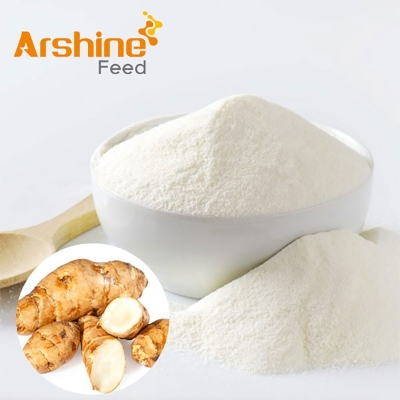Overview and research on mycotoxin and animal production
-
Last Update: 2020-07-01
-
Source: Internet
-
Author: User
Search more information of high quality chemicals, good prices and reliable suppliers, visit
www.echemi.com
series of reports on "International Summit Forum on Mycotoxin Risk Management"kBRLecture Topics: Overview and Research on Mycotoxin sycints and Animal Production
KBRSpeaker: Wayne Bryden - Professor of the University of Queensland, Australia
KBROn-site Interpreter: DrGuan Shu-Baiomin Asia Pacific Mycotoxin Technology ManagerkBRkBRSpeech Content:kBRMycotoxin sgenerated by fungiGlobally, mycotoxins have a huge impact on human and animal health, as well as on the international economy and tradeNow the international concern is aflatoxin, monoterminatal mycotoxin, aflatoxin, cargomine, corn mycomerketone and aflatoxinMost of them are highly toxic and some even carcinogenicAll feed feed ingredients are likely to be contaminated, but pollution levels vary greatly from region to region, reflecting different levels of farming and climatic conditions in each region kBR
Mycotoxins can be produced as crop fields grow and are produced throughout the feed supply chain The level of contamination of mycotoxins is usually not high enough to cause external disease and sudden death in the animals However, we should also pay attention to the low-dose harvest of daily food contaminated with mycotoxins will lead to the deterioration of animal health and lower production levels The most dangerous is the long-term harvesting of low-dose foods contaminated with mycotoxins that can lead to immunosuppression in feeding animals kBR
Mycotoxins are naturally occurring pollutants for animal feed, so in order to maintain the health and productivity of animals, we should try our best to guard against such risks kBR
In short, there are a number of ways to reduce the level of mycotoxin contamination in animal feed, including the use of anti-mold agents to reduce mold production, and the use of feed additive products such as mycotoxin adsorbents and decomposition enzymes to reduce or remove those already contaminated with mycotoxinfeed strains pollution levels and hazards! kBR
Related reading: kBR 1.Wayne Bryden Professor of Queensland University of Australia kBR 2.The harm of mycotoxins to poultry and biodegradation (Professor of agricultural science in China) kBR 3.Professor of Natural Resources and Life Sciences, With cow production (Dr Max Schuh, Vienna Veterinary College) kBR 5 Mycotoxin Risk Control Solutions (Gerd Schatzmayr Professor, Global Research and Development Director of the Bai omin Group) kBR 6 The influence and action of knife toxin on the reproductive performance of sows (Wu De, Professor, Sichuan Agricultural University) kBR 7 The Impact of Mycotoxin on Food Safety (Liu Yang, Chief Scientist, Agricultural Products Processing Research Institute, Chinese Academy of Agricultural Sciences) kBR "International Summit Forum on Mycotoxin Risk Management" series of reports (I) kBR lecture topic: Overview and research of mycotoxin sycinium toxin and animal production
kBR Speaker: Wayne Bryden - Professor k BR of the University of Queensland, Australia Globally, mycotoxins have a huge impact on human and animal health, as well as on the international economy and trade Now the international concern is aflatoxin, monoterminatal mycotoxin, aflatoxin, cargomine, corn mycomerketone and aflatoxin Most of them are highly toxic and some even carcinogenic All feed feed ingredients are likely to be contaminated, but pollution levels vary greatly from region to region, reflecting different levels of farming and climatic conditions in each region kBR
Mycotoxins can be produced as crop fields grow and are produced throughout the feed supply chain The level of contamination of mycotoxins is usually not high enough to cause external disease and sudden death in the animals However, we should also pay attention to the low-dose harvest of daily food contaminated with mycotoxins will lead to the deterioration of animal health and lower production levels The most dangerous is the long-term harvesting of low-dose foods contaminated with mycotoxins that can lead to immunosuppression in feeding animals kBR
Mycotoxins are naturally occurring pollutants for animal feed, so in order to maintain the health and productivity of animals, we should try our best to guard against such risks kBR
In short, there are a number of ways to reduce the level of mycotoxin contamination in animal feed, including the use of anti-mold agents to reduce mold production, and the use of feed additive products such as mycotoxin adsorbents and decomposition enzymes to reduce or remove those already contaminated with mycotoxinfeed strains pollution levels and hazards! kBR
Related reading: kBR 1.Wayne Bryden Professor of Queensland University of Australia kBR 2.The harm of mycotoxins to poultry and biodegradation (Professor of agricultural science in China) kBR 3.Professor of Natural Resources and Life Sciences, With cow production (Dr Max Schuh, Vienna Veterinary College) kBR 5 Mycotoxin Risk Control Solutions (Gerd Schatzmayr Professor, Global Research and Development Director of the Bai omin Group) kBR 6 The influence and action of knife toxin on the reproductive performance of sows (Wu De, Professor, Sichuan Agricultural University) kBR 7 Effects of mycotoxins on food safety (Liu Yang, Chief Scientist, Institute of Agricultural Products Processing, Chinese Academy of Agricultural Sciences) kBR
This article is an English version of an article which is originally in the Chinese language on echemi.com and is provided for information purposes only.
This website makes no representation or warranty of any kind, either expressed or implied, as to the accuracy, completeness ownership or reliability of
the article or any translations thereof. If you have any concerns or complaints relating to the article, please send an email, providing a detailed
description of the concern or complaint, to
service@echemi.com. A staff member will contact you within 5 working days. Once verified, infringing content
will be removed immediately.







